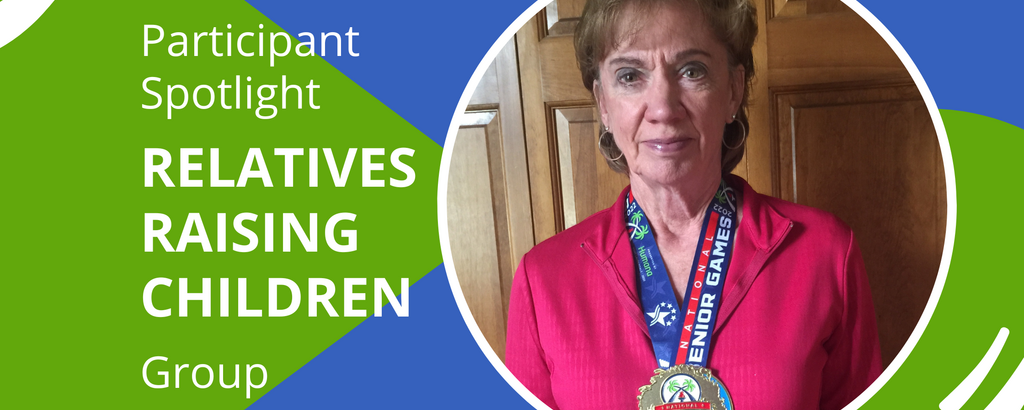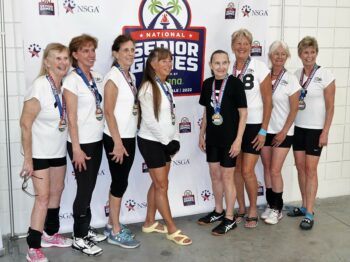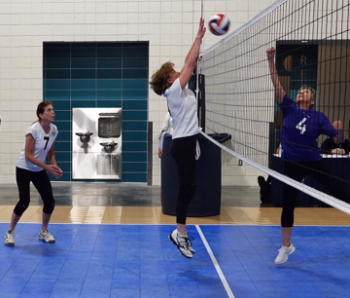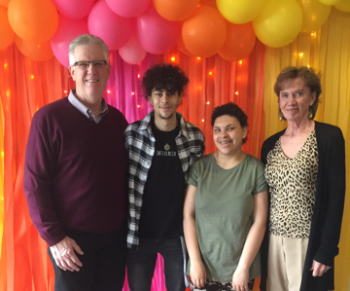
Participant Spotlight: Supporting Relatives Raising Children Group

“Volleyball is a major part of my self-care,” shares Vern. “I started playing volleyball in 7th grade – my team won a championship, and that got me going forever.” Now in her 70s, Vern’s volleyball team, the Chicago Heat, have won four gold medals, two silver, and three bronze at the National Senior Games, also called the Senior Olympics. Volleyball has not only been a big part of Vern’s life and wellness, but it has created many opportunities for her to connect with the grandchildren she is raising, her 17-year-old granddaughter and her 20-year-old grandson. Volleyball is also how Vern was introduced to KYC; Vern was playing volleyball when a friend told her about a newspaper ad she’d seen for a support group that KYC was offering for relatives who are raising kids. Her friend encouraged her to check it out, and 14 years later, Vern is still learning new ways to grow and connect with her grandkids through KYC’s Relatives Raising Children group.
Challenges and Joys of Parenting: Round Two

In speaking with Vern, it’s clear that she is extremely intentional in remaining both sharp and open-minded when it comes to building meaningful connections with others. Finding opportunities to laugh and celebrate her sense of humor are also particularly important to her. “I’ve been raising kids for 42 years now,” shares Vern. She recognizes that some of the challenges she’s facing now largely contrast her first round of parenting, from feeling like she has less in common with their heavily tech-driven interests, to joking that school fundraisers are trickier now. Vern mentions, half-laughing, “Who do you go to when you’re a parent promoting a fundraiser? The grandparents. So, who do you hit up for money when you are the grandparents?” Another common conflict she points out is the difficulty in returning to finding babysitters when planning to go out; alongside feeling less able to travel freely as she had pictured doing in her senior years.
Despite the challenges, she and her husband have found some differences that may be fortuitously helpful; “now when we go places,” Vern shares, “[the kids] get the children’s rates, and you get the senior rates!” While travel may be more difficult now, Vern recounts a sweet memory of when her grandson told her granddaughter, “you’re so lucky Grandma and I play sports because you get to go on all these wonderful trips with us,” as the family has made vacations out of their sports tournaments. Through it all, Vern emphasizes how taking time for yourself and connecting with others going through similar situations makes it much easier to handle.
Building Connection and Community
KYC’s Relatives Raising Children Group is intended to build an environment in which parenting relatives can bring their specific challenges, concerns, and insights to share, along with resources that are most relevant to the issues they are facing. Rather than adhering to a pre-determined curriculum, this flexibility allows group participants to explore the topics that are most immediately helpful to them, all while connecting with others who can directly relate.
When Vern connected with KYC, she was dealing with an immense amount of loss. Her mother, her brother-in-law, and her beloved dog all passed away within a couple of months. Her daughter’s children, then 3 and 5, came under Vern’s care alongside her husband. In addition to processing these extremely difficult losses, she described that she was suddenly also dealing with the loss of much of her freedom in exchange for caring for her grandkids. Vern knew she simultaneously needed to transition her relationship with her grandkids from being a loving grandparent to now being a primary caregiver: she had to make the move from grandparenting to parenting. A number of years later, Vern’s daughter died. As Vern and her grandchildren all came together to process the grief, they built stronger relationships with one another while creating space to experience the loss they each felt.
Vern recalls that Daxa, KYC’s Caregiver Specialist and leader of the Relative Raising Children group, hosted a speaker to talk to the group about grief and loss shortly after Vern joined. As Vern shares, “handling grief is also taking care of yourself-it’s very important that you go through it and don’t just stall it.” Dealing with the losses of loved ones and parenting are never easy. Having a caring support network like the one Vern established for herself through this group provided her with additional insight to navigate many aspects of these challenges.
Learning to Thrive

Group members not only learn from Daxa, an experienced social worker, but they also learn from one another. Many group participants share common experiences. Vern shares that “every one of us gets a chance to say something in each meeting,” creating space for members to connect and share how they may have addressed similar situations.
“We’ve had speakers come in and talk about social media – things we’re not as familiar with. We’ve also had speakers talk about guardianship and adoption, and they direct us to helpful books and websites. They have also talked about survivor benefits,” all of which has been very helpful, adds Vern.
Many group participants also now find themselves as part of a “sandwich generation” of folks caring for young children as well as for aging parents and/or spouses. With so many caregiving responsibilities, it can be incredibly difficult to make time to care for oneself, but this is also something that the group strongly emphasizes. “Daxa has always stressed the importance of taking care of ourselves mentally, emotionally, and physically,” shares Vern, as a critical step in providing the care that others need from caregivers, as well.
Caring for Yourself to Care for Others
Caring for others can be incredibly time-consuming and challenging. Though it can be exceedingly difficult for caregivers to find time for themselves, Vern shares that “taking care of yourself and your relationship with your spouse is the most important thing you can do”. This is also a sentiment that Daxa emphasizes with the group and works to create space during meetings for participants to socialize and enjoy one another’s company.
“Daxa plans group activities that coincide with the emotional, physical, and mental help that we get by doing them together and bonding as a group. Then we’re able to open up more to each other in meetings,” Vern explains. Activities have included a painting party, a mini golf outing, membership and a trip to the Morten Arboretum, and enjoying a meal together. Each activity is an opportunity to build trust for the work they do through the group, but also gives each participant a chance to be themselves, have fun, and connect with other adults who are not depending on them. “It’s so good to belong to a support group where people have the same things in common as you, and you can just feel comfortable to complain if you need to and not feel badly,” Vern offers.

Vern's family enjoying the holiday lights at the Morten Arboretum
Vern expounds that a big part of her success in raising her grandchildren has been her “stick-to-it-iveness”. Although it can be onerous to continue to make time to care for herself, she is committed to taking time to play (and win!) volleyball and connect and laugh with friends. She has found unique ways to connect with her grandkids on individual levels by participating in their interests – whether it’s by walking her dog with her grandson when he returns from work, or volunteering on Saturdays with her granddaughter- and by sharing her own interests with them. Volleyball has become a cherished shared activity, becoming a vacation opportunity for the family, and creating “date nights” for her and her husband to enjoy watching games together.
She also maximizes the resources that are available to her. “There are so many people who could benefit from groups like KYC’s Relatives Raising Children Group,” she shares. Caring for a new generation of children is challenging enough – making the most of free resources can help.
Connect with KYC
To learn more about KYC’s Relatives Raising Children Group, call KYC at 847−524−8800 ext. 168.
Learn more about our Caregiver resources from our Caregiver Specialist, Daxa.
Previous Article Next Article

